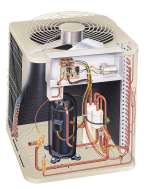Search engine visitors - click here to access entire "$ensible Home" web site
Click here to see a descriptive illustration of several new heat pumps and a complete comfort system.

Dear Jim: I hear people install a heat pump instead of a furnace and air conditioner even in cold climates. I can't afford a geothermal one. Would a standard air heat pump work well and what are newest designs? - Mike H.
A: Heat pumps are becoming a more common alternative to central air conditioners because they can also heat your house. The cost of electricity for heating and cooling a house, although it gradually increases as do most prices over time, is much less volatile than natural gas, oil or propane. You may also get up to a 30% tax credit for installing a heat pump.
A geothermal heat pump is one of the most energy efficient heating and cooling systems for any climate. Even though it provides a good payback on the investment, particularly in very hot or cold climates, the initial installation costs are considerably higher than for air-source models.
An air-source heat pump is basically a central air conditioner with a few extra parts. During the summer, it draws heat from the indoor air and, through a refrigeration cycle identical to an air conditioner, expels the heat outdoors. The cooling efficiency is rated by its SEER (seasonal energy efficiency ratio).
During the winter, a reversing valve inside the outdoor condenser unit switches position. This reverses the flow of the refrigerant so it begins to draw heat from the outdoor air and transfers it so an indoor coil. Heating efficiency is rated by HSPF (heating seasonal performance factor).
There have been many recent developments in air-source heat pumps. The modulating, multistage output rotary compressor design is now available in heat pumps. This design produces extremely high efficiencies for both heating and cooling (HSPF - 10, SEER 22). You can get $2 to $3 worth of heat for each $1 on your utility bills.
This heat pump uses a rotary compressor with inverter technology to allow it to vary its heating or cooling output from about one-third to full capacity output. This not only saves electricity, but it also produces extremely good comfort, quiet operation and even room temperatures. Two-stage heat pumps also improve efficiency and comfort over standard single-stage models.
Another new heat pump design is for cold climates. It uses a second booster compressor to allow it to continue to produce heat efficiently at lower outdoor temperatures. It offers four heating and two cooling stages. Other non-booster heat pumps can be coupled with a high-efficiency gas furnace for a hybrid system in cold climates for efficiency and better comfort.
Another new two-stage heat pump design couples a solar panel with the outdoor unit. One a sunny day, this solar panel produces enough electricity to operate the condenser fan for up to an eight-percent electricity savings.
Instant Download Update Bulletin No. 312 - Buyer's guide of the most efficient, comfortable heat pumps, capacities, compressor types, output levels, blower speeds, efficiencies (HSPF and SEER), warranties, illustration and description of how a scroll compressor works, heat pump maintenance suggestions and a savings/payback chart.
Dear Jim: My garage door opener motor seems to be struggling to open the garage door. It is noisy and seems to vibrate a lot. It has those tightly wound springs. Should I tighten them more to help lift the door? - Ed R.
A: The springs you are referring to are counterbalance torsion springs. They may have relaxed over time which causes the opener motor to work harder to open the door.
First make sure all the mounting bolts are tight. Trying to tighten those torsion springs yourself can be dangerous. If one comes loose while you have a rod in it, the rod can break your arm. Call a professional serviceman check it for you.